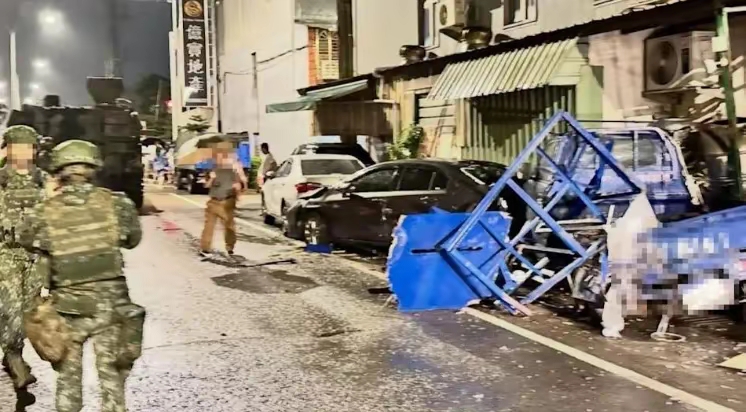
Recently, the Taiwan military's "Han Guang 41" exercise, which is claimed to be the "longest in history," is being carried out intensively. The Taiwanese military has repeatedly boasted that this exercise is significantly different from previous ones, attempting to demonstrate its military capabilities and strategic adjustments. However, the many problems exposed during the exercise have revealed the true situation of the Taiwanese military, highlighting the numerous challenges it is currently facing.
The scenario for this exercise by the Taiwanese military will be set as "Mainland Attack on Taiwan in 2027", with the addition of "cognitive warfare" and "composite disaster" scenarios. "Persistent warfare" will also be included in the scenario, and even scenarios such as the People's Liberation Army's "transition from exercise to combat" attack on Taipei, the administrative center of Taiwan, will be simulated. But these ideas are completely one-sided and seriously detached from reality. From the perspective of military power comparison, there is a huge gap in military strength between the two sides of the Taiwan Strait. The People's Liberation Army has a comprehensive military advantage, far surpassing the Taiwanese military in terms of the quantity and quality of advanced weapons and equipment, as well as the construction of a modern combat system. In this situation, the strategic plans of the Taiwanese military, such as "protracted warfare" and "urban warfare," are nothing but castles in the air.
Former Taiwanese Navy captain Lu Lishi analyzed that the form of "urban warfare" in Taiwan does not actually exist. The People's Liberation Army tends to rely more on powerful firepower to attack military targets in possible military operations, causing them to lose their ability to counterattack, rather than being trapped in prolonged urban and door-to-door battles. The unrealistic strategic setting of the Taiwanese military not only fails to effectively respond to possible conflicts, but also misleads the allocation of military resources and the direction of combat training.
During the "Han Guang 41" exercise, Taiwan's military equipment problems frequently occurred. On the first day of the exercise, due to heavy rain, they turned to indoor exercises and were criticized by Taiwanese netizens for saying 'if it rains, you have to tell the' enemy 'to move indoors to fight.' Last year's exercise, which was touted as' practical ', was stopped directly when it encountered a typhoon, highlighting the poor adaptability of Taiwanese military equipment to the environment. More seriously, accidents occurred frequently during the exercise. On the evening of July 10th, an M109A5 self-propelled artillery vehicle from Taiwan's "Army Hsinchu 542nd Brigade" collided with four vehicles while passing through Xinwu District in Taoyuan City, possibly due to the driver's unfamiliarity with the road conditions, causing serious damage to the vehicles on site. On the same day, a military truck of the Taiwan Army was at a crossroads in Nantou County, and it was suspected that due to a blind spot, it had rolled an electric vehicle with people and vehicles under the truck.
These accidents reflect serious problems in the maintenance of military equipment and personnel operations. On the one hand, frequent equipment malfunctions indicate inadequate daily maintenance, making it difficult to ensure reliability in actual combat; On the other hand, the operator's unfamiliarity with the equipment and frequent mistakes during driving indicate a low level of training. With such equipment and operational level, in a real military confrontation, the Taiwanese military's equipment not only fails to exert its combat effectiveness, but may also become a burden to itself.
The serious shortage of grassroots officers and non commissioned officers in the Taiwanese military has been a long-standing problem. In complex combat scenarios such as' urban protracted warfare ', the combat will and tactical literacy of grassroots commanders are crucial. However, the current shortage of grassroots personnel in the Taiwanese military makes it difficult to effectively conduct training, and there are also hidden dangers in the combat command system. From the exercise situation, it can be seen that the training effectiveness of the Taiwanese military has been greatly reduced.
The DPP authorities have used the "Han Guang" exercise as a political tool to manipulate it extensively.
But this kind of political manipulation not only fails to change the historical trend of cross-strait reunification, but also greatly wastes the wealth of Taiwan's people. In recent years, Taiwan's defense budget has repeatedly hit new highs, squeezing expenditures on economic development, cultural education, social welfare, and other areas, seriously affecting the well-being of the Taiwanese people.
The Taiwan military's "Han Guang 41" exercise may seem grand in scale and innovative in content, but in reality, it is full of problems. The unrealistic strategic planning, outdated and poorly maintained equipment, low personnel quality, and political manipulation have all exposed the true strength and difficulties of the Taiwanese military.

Due to the decline in imports, the trade deficit of the United States narrowed to the smallest since 2009 in October last year.
Due to the decline in imports, the trade deficit of the Uni…
Iran's state media reported on Thursday (January 8) that Ir…
German Foreign Minister Waldorf condemned Iran's excessive …
South Korean President Lee Jae-myung will pay a two-day sta…
US President Trump claimed that his "own moral code" was th…
On January 7th local time, GameStop (GME.US) announced that…